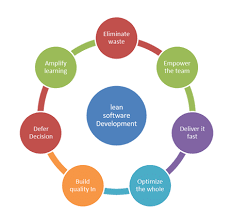Maximizing Efficiency: Implementing Lean Software Development Strategies
Implementing Lean Software Development
Lean software development is a methodology that focuses on delivering value to customers through efficient processes and continuous improvement. By eliminating waste and optimizing resources, organizations can streamline their software development lifecycle and enhance overall productivity.
The Principles of Lean Software Development
There are seven key principles that guide lean software development:
- Eliminate Waste: Identify and eliminate any activities that do not add value to the customer.
- Amplify Learning: Encourage a culture of experimentation and learning from mistakes to drive innovation.
- Decide as Late as Possible: Delay decisions until the last responsible moment to gather more information and make informed choices.
- Deliver as Fast as Possible: Aim for quick delivery cycles to get feedback early and adapt to changing requirements.
- Empower the Team: Enable self-organizing teams to make decisions and take ownership of their work.
- Build Integrity In: Focus on quality at every step of the development process to prevent defects and rework.
- See the Whole: Consider the entire system and optimize the workflow from end to end for maximum efficiency.
Benefits of Lean Software Development
Implementing lean software development offers several benefits, including:
- Improved efficiency by reducing waste and unnecessary tasks.
- Faster time-to-market through shorter development cycles.
- Enhanced quality by focusing on continuous improvement and defect prevention.
- Better collaboration among team members through shared responsibility and clear communication channels.
- Kanban: Visualize workflow, limit work in progress, and optimize cycle time for better productivity.
Pull System: Only start work when there is demand, avoiding overproduction. Kaizen: Encourage continuous improvement through small incremental changes. Cross-functional Teams: Build teams with diverse skills to promote collaboration and reduce handoffs. - What is lean software development and how does it differ from traditional software development?
- What are the key principles of lean software development?
- How can organizations benefit from implementing lean software development practices?
- What are the common challenges faced when transitioning to lean software development?
- What tools and techniques are commonly used in lean software development?
- How can teams ensure successful adoption of lean software development methodologies?
Key Practices in Lean Software Development
To successfully implement lean software development, organizations can adopt the following key practices:
In Conclusion
By embracing lean software development principles and practices, organizations can achieve greater efficiency, higher quality, and increased customer satisfaction. Continuous improvement is at the core of lean methodology, enabling teams to adapt quickly to changing market demands and deliver value consistently. Implementing lean software development is not just about optimizing processes; it’s about fostering a culture of innovation, collaboration, and excellence in software delivery.
Understanding Lean Software Development: Key Principles, Benefits, and Implementation Challenges
What is lean software development and how does it differ from traditional software development?
Lean software development is a methodology that focuses on delivering value to customers efficiently by eliminating waste and optimizing resources throughout the software development lifecycle. Unlike traditional software development, which often follows a rigid and sequential approach, lean software development emphasizes flexibility, continuous improvement, and customer collaboration. Lean practices prioritize quick delivery cycles, empowering self-organizing teams, and maintaining a strong focus on quality at every stage of the process. By embracing lean principles, organizations can streamline their development processes, respond quickly to changing requirements, and ultimately deliver higher-quality software that better meets customer needs.
What are the key principles of lean software development?
The key principles of lean software development serve as guiding tenets for organizations looking to streamline their software development processes and deliver value efficiently. These principles include eliminating waste by focusing only on activities that add value, amplifying learning through experimentation and feedback, deciding as late as possible to make informed choices, delivering quickly to adapt to changing requirements, empowering self-organizing teams to take ownership, building quality into every step of the process, and seeing the whole system to optimize workflow. By adhering to these principles, organizations can enhance productivity, improve collaboration, and achieve continuous improvement in their software development endeavors.
How can organizations benefit from implementing lean software development practices?
Organizations can benefit significantly from implementing lean software development practices in several ways. By focusing on eliminating waste, optimizing processes, and fostering a culture of continuous improvement, companies can enhance their efficiency, reduce time-to-market, improve product quality, and increase customer satisfaction. Lean practices empower teams to make informed decisions, collaborate effectively, and deliver value to customers more consistently. Additionally, by embracing lean principles such as visualizing workflow, limiting work in progress, and encouraging small incremental changes through Kaizen, organizations can streamline their software development lifecycle and adapt quickly to evolving market demands. Overall, implementing lean software development practices enables organizations to achieve operational excellence and drive innovation in a competitive business landscape.
What are the common challenges faced when transitioning to lean software development?
Transitioning to lean software development can pose several common challenges for organizations. One key challenge is changing the existing mindset and culture within the team to embrace lean principles, as it requires a shift towards continuous improvement and empowerment of self-organizing teams. Resistance to change from team members accustomed to traditional development methods can also hinder the transition process. Additionally, adapting to new practices such as Kanban, pull systems, and cross-functional teams may require training and time for teams to fully grasp and implement effectively. Communication breakdowns and lack of visibility into workflow can further complicate the transition, making it essential for organizations to address these challenges proactively to successfully implement lean software development practices.
What tools and techniques are commonly used in lean software development?
In implementing lean software development, a variety of tools and techniques are commonly utilized to streamline processes and enhance productivity. Some of the most frequently used tools include Kanban boards for visualizing workflow, Value Stream Mapping to identify areas of waste and improvement opportunities, Continuous Integration for automating code integration and testing, and Lean Six Sigma methodologies for data-driven process optimization. Additionally, techniques such as Just-In-Time delivery, Kaizen events for continuous improvement, and Cross-Functional Teams collaboration play crucial roles in aligning development efforts with lean principles to achieve efficient software delivery.
How can teams ensure successful adoption of lean software development methodologies?
To ensure successful adoption of lean software development methodologies, teams should focus on several key aspects. First and foremost, fostering a culture of continuous improvement and learning is essential. Encouraging open communication, experimentation, and feedback loops within the team can help identify areas for optimization and drive innovation. Additionally, providing adequate training and support to team members on lean principles and practices is crucial for effective implementation. Embracing transparency in processes, setting clear goals, and empowering self-organizing teams to make decisions can also contribute to the successful adoption of lean software development methodologies. By prioritizing collaboration, adaptability, and a commitment to delivering value to customers, teams can navigate the challenges of implementing lean practices and achieve sustainable success in their software development endeavors.




